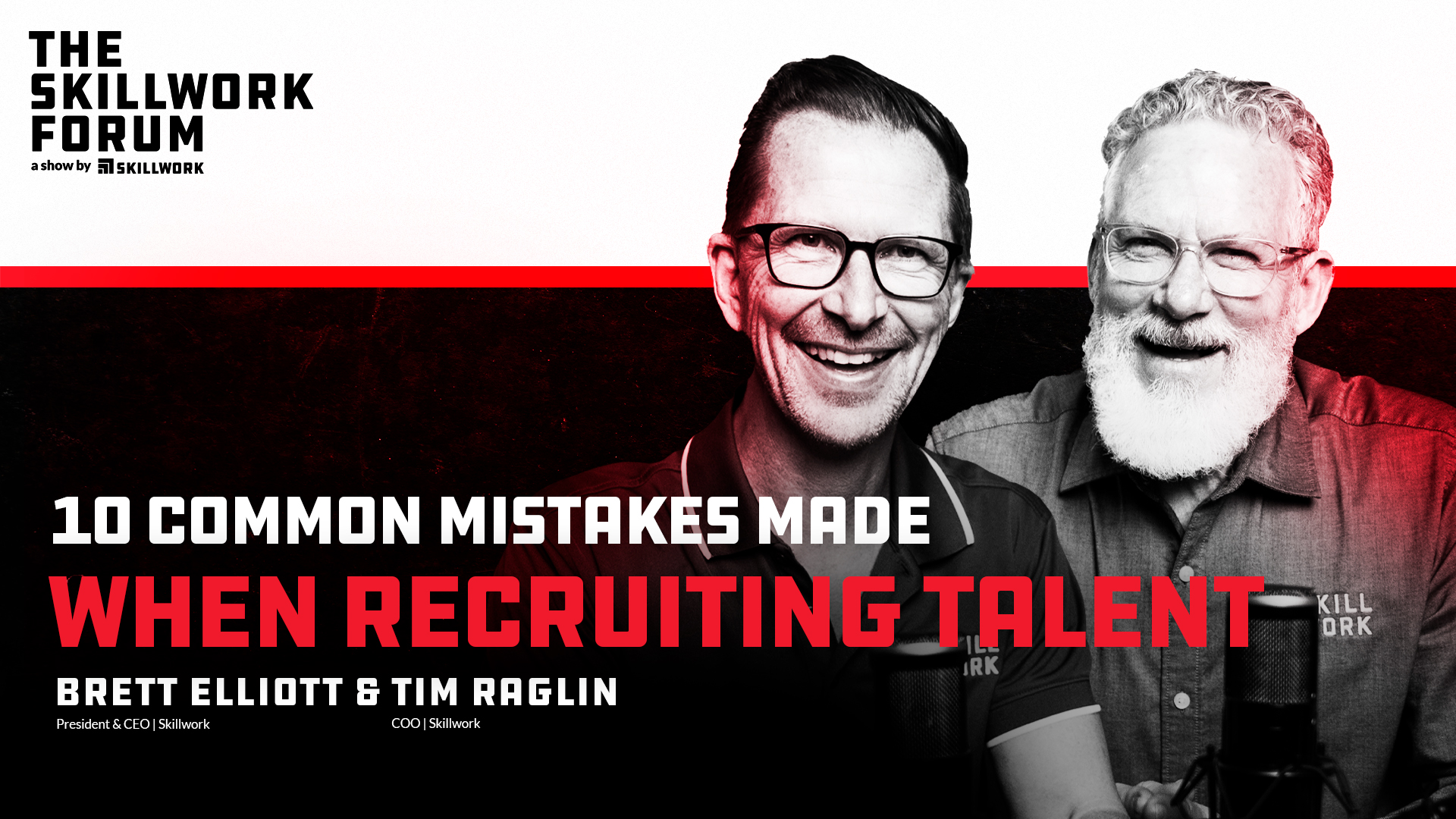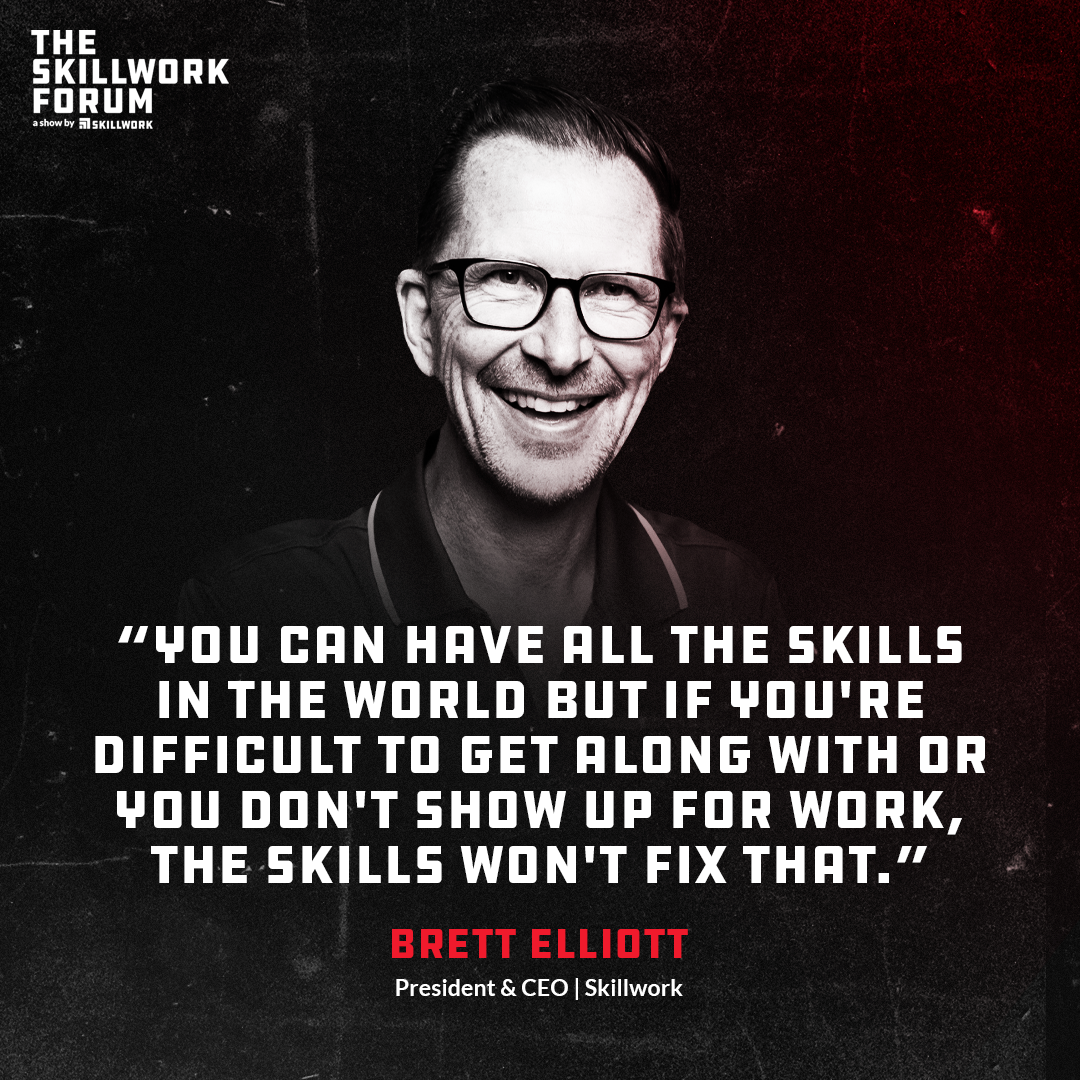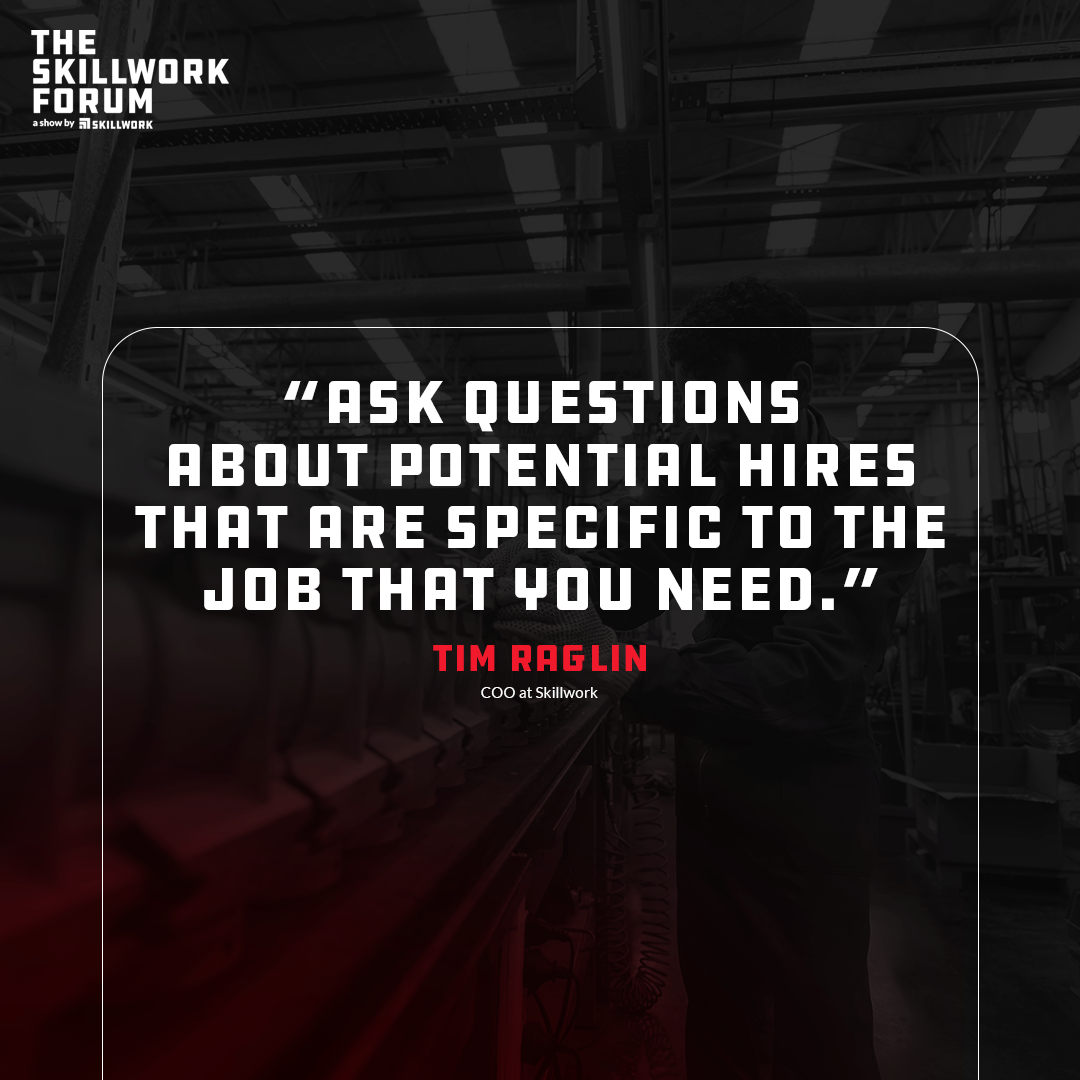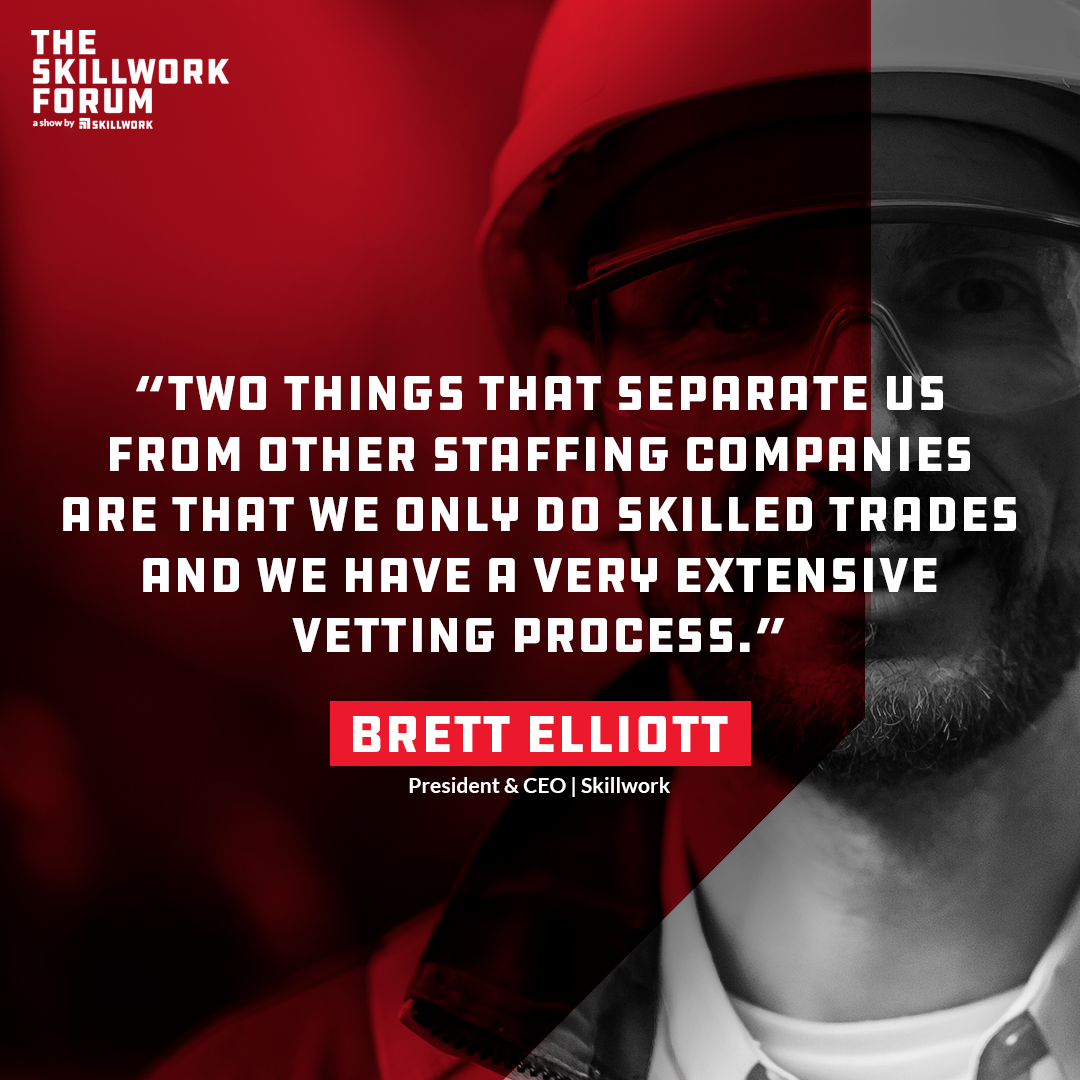10 Common Mistakes Made When Recruiting Talent

Staffing challenges have been plaguing skilled labor employers for years. Unfortunately, these trade labor hiring issues aren’t going away and may remain for years to come.
But that doesn’t mean there aren’t things you and your team can do to make hiring easier.
There are ways to overcome some of the recruitment challenges surrounding the skilled trades, and one of them is recognizing and avoiding major hiring manager mistakes.
Want to learn about the most common hiring mistakes recruiters make when placing skilled workers? Watch the podcast below or keep reading this article to learn more.
As you listen to the podcast above or read this article, you’ll learn the top ten recruiting mistakes to avoid and also:
- Why recruiting is important
- What successful recruiting processes look like
- The value of a good vetting process for employment
- How to vet employees
- The best way to recruit staff
So, here’s a list of common hiring mistakes to look out for as you recruit skilled workers.
The Top 10 Hiring Manager Mistakes to Avoid
Open positions and/or poor hires will both lead to decreased productivity and revenue. With the current labor shortage, it’s a real challenge to avoid these two situations–but it’s not impossible!
It all starts with a successful recruitment process.
Here are ten pitfalls to avoid during your skilled labor recruitment process to make it as successful as possible.
1. Overselling a Job
As an internal or external recruiter, your job is to place candidates. Sometimes, in an effort to get a candidate into a job opening, it can be easy to bend the truth or leave out small details about the job or hiring company.
Our advice to you is: don’t sugarcoat the challenges or sell a “dream” scenario to candidates.
Instead, be upfront and honest about the job, its roles and responsibilities, and the company they’ll be working for. It’s better to have 100% buy-in on what the reality of the situation is versus a letdown and fallout of a dishonest pitch.
Take time to talk about and sell the benefits and advantages of the job, but don’t leave out any potential negatives, either.
2. Overlooking the Warning Signs or Lowering Expectations
Another one of the most common hiring manager mistakes is overlooking warning signs or lowering your expectations.
Don’t lower your standards or disregard red flags. Be okay with the reality and don’t get so eager to employ someone that you hire an unqualified candidate.
Do you know what the effects of hiring unqualified candidates are?
It’s often some combination of:
- Decreased productivity
- Toxic work culture
- Unsafe work environments
- Having to let the employee go
- Lost revenue
So, trust your vetting process for employment. You have your process in place to help you sift through candidates and ensure they’re a fit for the role. You don’t want to fit a square peg in a round hole, and that’s what proper vetting techniques keep you from doing.
Or, if you don’t have a thorough vetting process, put one in place. If you’re unsure how to vet employees, you can check out our 8-step gating and vetting process below to get an idea of what one might look like.
We’ve found that the best way to recruit staff is to be thorough and do it right the first time, and that’s what this 8-step recruitment process allows us to do.
3. Ignoring Personality, Character, and Aptitude
Another mistake that recruits can make is to ignore soft skills (personality, character, aptitude) in lieu of hard skills/experience.
It’s important to keep in mind that soft skills are just as important in the trades as hard skills.
You don’t want to marginalize hard skills/experience. It’s necessary that the candidates you hire have the tangible skills to do the job. However, you also need to “recruit soft skills”— people who are a good culture and personality fit.
Here at Skillwork, we’ve found that we rarely miss on hard skills; it’s usually these soft skills that are tougher to get right. This is another reason why it’s important to take your time during the hiring process and thoroughly vet each candidate.
4. Caring More About Filling the Job Than the Person
Fourth, one of the best ways to recruit staff is to take a candidate’s needs and desires into consideration when trying to get them into an open job. This involves listening to a candidate and really discerning whether the job is a good fit for them.
You don’t want to place (or hire) a bunch of workers at the expense of the candidates themselves. Putting an employee into a position that’s not a good fit for them will ultimately hurt both the candidate and the company hiring them.
Instead, you want to place candidates into a role or at an organization that sets them up for success. When candidates can grow and thrive, so can the company that hires them.
5. Failing to Take Ownership of the Candidate After You Place Them
As a recruiter, you don’t want to take a “set it and forget it” mentality toward placing candidates. Rather, piggybacking on the previous point, we want to urge you to take ownership of the candidate's success from start to finish.
Our advice to you is to care about the individual. Check in with them regularly to make sure they’re satisfied and happy with the job.
Whether you’re an internal or external recruiter, it’s not just about getting a candidate in the door and into their job. Instead, a successful recruitment process leads to both a tradesperson’s and a hiring company’s long-term success.
6. Talking More Than Listening
The sixth pitfall that recruiters can easily fall into is talking more than listening.
As a recruiter, it can be easy to get caught up in your pitch and forget to leave room for the candidate to talk or ask questions.
Growing in maturity as a recruiter often means moving from a pitch to a dialogue. Great recruiters eventually realize that recruitment is more about building the relationship than simply finishing their pitch.
For anyone who coaches or oversees recruiters, know what your recruiters are saying and doing during calls. Observe how they engage with candidates and help them make the move from a pitch to a dialogue.
7. Passing Over Qualified Candidates or Underqualified Candidates
Next, we want to encourage you not to pass overqualified or underqualified candidates.
This means that you shouldn’t assume what someone’s motives are until you talk to them. You may see someone’s resume and think, “They don’t want this job, they’re too qualified” or “This candidate doesn’t have the experience, they can’t handle this job.”
However, someone with a lot of experience may want to get “back into the trenches” instead of being hired into a managerial role. Or, someone with less experience may be an incredibly talented and fast learner.
Your vetting and gating process shouldn’t be an “If you don’t pass this one test, you’re out.” They’re more warning signs than hard and fast rules.
Obviously, as we mentioned earlier, don’t gloss over red flags or lower your expectations. But you also don’t want to disqualify someone without digging deeper. Someone may seem somewhat overqualified or underqualified, but could still be a good fit for a role.
8. Don’t Look for the Perfect Hire
The eighth mistake we commonly see recruiters make is looking for the perfect candidate. This usually happens when the recruiter fears making a hiring mistake.
Here are our three encouragements:
- Don’t let fear of making a hiring mistake push you to only look for perfection.
- Don’t lower the bar, but don’t raise the bar so high that it hinders you from hiring qualified candidates.
- It’s okay to be flexible in your hiring process—you can’t always look for that next “unicorn”.
You’re human and so are the candidates you’re hiring. You will make hiring mistakes.
However, if you have good vetting techniques and you learn from your mistakes, you’ll hire many more good candidates than bad.
9. Failing to Get Solid References
Ninth, recruiters can often fail to get good references.
A candidate’s past doesn’t necessarily define their future, but it can help when vetting candidates. So, you’ll want candidates to provide references.
Then, you’ll want to take time to talk with these references and ask about the candidate:
- What were the candidate’s attitude and work ethic like?
- Did they follow all your company’s prescribed safety precautions?
- How well did they work with others?
- Was this candidate a good leader?
Take everything with a grain of salt and don’t let references completely dictate your decision about a potential hire. However, let it be another guide or “warning sign” about that person.
10. Unclear Job Description or Requirements
The last of our hiring manager mistakes is not having clear job descriptions or requirements.
In order to effectively find a qualified candidate, it’s helpful for recruiters to know exactly what they’re looking for. Unfortunately, most managers aren’t 100% sure what they need and often give general or vague job descriptions.
Our advice is to get your recruiting team connected to the people who are talking to clients about their needs. If recruiters can get firsthand information from clients, it’s much easier for the recruiter to get an idea of the client’s “must-haves” vs. their “nice-to-haves.”
This will ensure that the recruiter can accurately target qualified candidates for a particular job opening.
Overcome Hiring Issues and Staffing Challenges Today
A successful recruiting process isn’t one that simply fills employment gaps. Rather, it allows you to identify and hire qualified candidates who will bring value to your company. Taking your time in the recruiting process and implementing good vetting techniques can help you find the right candidate the first time.
The biggest challenge in the recruitment of staff is finding, hiring, and retaining top talent. If you’re a skilled labor employer and are struggling to fill open positions, reach out to us here at Skillwork.
Our sole focus is on connecting qualified skilled workers with companies in need of more talent. We take the time to understand you, your company, and your needs. Then, our Recruiters get to work finding the perfect candidates to fill your open positions. The best part is, that you can hire our workers for short- or long-term contracts—whatever you need.
Contact us today to talk to a Recruiter and learn more about how we can help you get the skilled workers you need, when you need them.


.png?width=1080&name=210505_Skillwork%20_TSWF_Ep_10%20Common%20Mistakes%20Made%20When%20Recruiting%20Talent_QG1%20(1).png)




